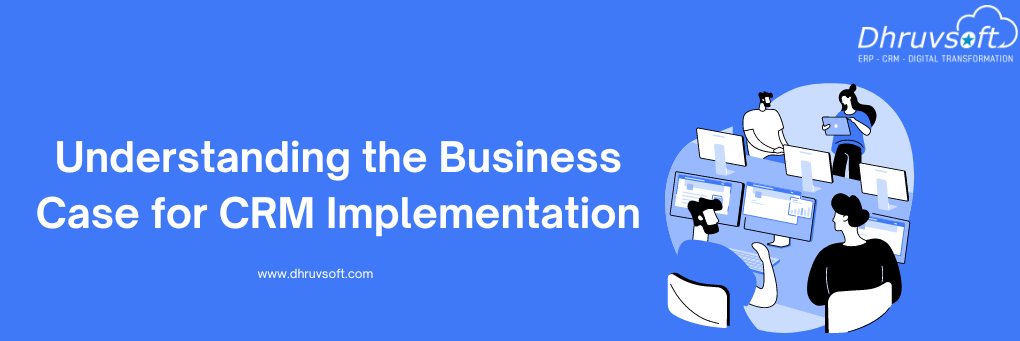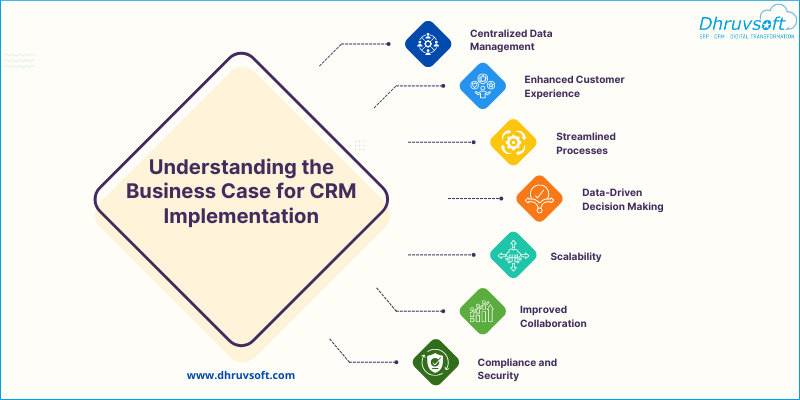How a CRM System Drives Business Value and Improves Operational Efficiency
In today’s rapidly evolving business landscape, companies are under immense pressure to remain competitive, enhance customer satisfaction, and drive sustainable growth. To meet these challenges, businesses need to optimize their operations, streamline processes, and build stronger customer relationships. A Customer Relationship Management (CRM) system is a powerful tool that enables organizations to achieve these objectives by centralizing data, automating tasks, and providing actionable insights. But beyond the technology, the true value of CRM lies in how it drives business outcomes and operational efficiency.

In this article, we’ll explore the comprehensive business case for CRM implementation, delving into how it can transform your organization, from improving customer engagement to boosting productivity and scalability.
Business Case for CRM Implementation

1. Centralized Data Management: A Single Source of Truth
One of the fundamental challenges businesses face is the fragmentation of customer data across various departments and systems. Sales teams might use one platform to track leads, customer supports another to manage tickets, and marketing yet another to run campaigns. This siloed approach often leads to miscommunication, redundant efforts, and a fragmented view of the customer.
A CRM system addresses this issue by consolidating all customer-related data into a single, centralized platform. This creates a “single source of truth” where every department—from sales and marketing to customer service—can access the most up-to-date information about each customer. This unified data repository ensures that everyone is on the same page, reducing errors, and enabling more informed decision-making.
Value-Driven Insights During the Sales Cycle using CRM: Centralized data management using a CRM allows businesses to leverage customer information more effectively. By analyzing customer behavior patterns and interactions, companies can identify key opportunities, such as upsell or cross-sell potential and tailor their strategies accordingly.
Additionally, having a complete view of the customer journey enables more personalized interactions, which can significantly enhance customer satisfaction and loyalty. For instance, if a customer has expressed interest in a particular product during a previous interaction, the sales team can follow up with a personalized offer, increasing the likelihood of a sale.
Salesforce.com Products like Sales Cloud, Service Cloud along with Data Cloud help organizations achieve the state where they have a Single Source of Truth.
2. Enhanced Customer Experience: Building Stronger Relationships
Customer experience has become a critical differentiator in today’s competitive market. Companies that can consistently deliver exceptional customer experiences are more likely to retain customers and foster long-term loyalty. A CRM system plays a pivotal role in enhancing customer experience by providing a 360-degree view of each customer, including their preferences, purchase history, and previous interactions with the company.
With this comprehensive customer profile, sales and support teams can personalize their interactions, addressing each customer’s unique needs and concerns. For example, if a customer has previously raised an issue with a product, the support team can proactively follow up to ensure that the issue has been resolved to the customer’s satisfaction. Moreover, CRM systems enable businesses to automate follow-ups, reminders, and other communication tasks, ensuring that no customer is left unattended.
Better Customer Experience through Operational Efficiency: Automation within a CRM system significantly reduces the manual workload on teams. Tasks such as data entry, scheduling follow-ups, and sending personalized emails can be automated, freeing up valuable time for employees to focus on high-impact activities. This not only improves productivity but also ensures a more consistent and timely customer experience. For example, automated follow-up emails can be triggered based on specific customer actions, such as downloading a whitepaper or abandoning a shopping cart, helping to re-engage the customer and move them further down the sales funnel.
CRM products like Salesforce Experience Cloud, and Commerce Cloud, coupled with Sales Cloud help organizations give one of the best Customer Experiences.
3. Streamlined Processes: Automating Repetitive Tasks
Operational efficiency is key to sustaining business growth, and one of the most effective ways to achieve it is by automating repetitive tasks. CRM systems excel in this area by offering a wide range of automation tools that streamline processes across the organization. Whether it’s automating lead assignments based on predefined criteria, scheduling follow-up calls, or generating reports, CRM systems take the burden off employees, allowing them to focus on more strategic initiatives.
For example, in a traditional sales environment, a sales representative might spend a significant amount of time manually entering data, updating records, and setting reminders for follow-ups. With a CRM system, these tasks can be automated, ensuring that no lead falls through the cracks and that the sales team can prioritize their efforts on closing deals rather than managing administrative tasks.
Automate routine tasks to achieve greater Sales Velocity: Streamlined processes lead to shorter sales cycles, higher conversion rates, and improved overall efficiency. By automating routine tasks, companies can respond more quickly to customer inquiries, provide timely follow-ups, and deliver a more seamless customer experience. This not only enhances customer satisfaction but also drives revenue growth. For instance, by automating lead scoring and prioritization, sales teams can focus on the most promising leads, increasing the likelihood of successful conversions.
CRM Products like Salesforce.com and Zoho help organizations automate recurring tasks using automated workflows, templates, and macros.
4. Data-Driven Decision Making: Leveraging Analytics
In the age of big data, making informed decisions based on accurate, real-time information is critical to business success. CRM systems are equipped with powerful analytics and reporting tools that provide deep insights into customer behavior, sales performance, and marketing effectiveness. These insights enable businesses to make data-driven decisions that are aligned with their strategic objectives.
For example, a CRM system can track the performance of marketing campaigns in real time, allowing businesses to quickly identify which campaigns are generating the most leads and which are underperforming. This data can then be used to optimize marketing efforts, allocate resources more effectively, and maximize return on investment.
Achieve Operational Efficiency by using data for decision-making: Data-driven decision-making enhances operational efficiency by enabling companies to identify areas of improvement quickly and make necessary adjustments. For example, if a CRM system reveals that a particular sales tactic is not yielding the desired results, the sales team can swiftly pivot to a more effective strategy. This agility allows businesses to stay ahead of the competition and continuously improve their operations. Moreover, CRM systems often include predictive analytics capabilities, which can forecast future sales trends, customer behaviors, and market shifts, allowing companies to plan proactively and adapt their strategies.
CRM systems Like Salesforce.com and Zoho have inbuilt Analytics and Reporting tools. For advanced reports, organizations can evaluate BI tools like Salesforce Tableau or Zoho Analytics.
5. Scalability: Supporting Growth
As businesses grow, their operational needs become more complex. A CRM system provides the scalability needed to support this growth, allowing companies to add new users easily, integrate additional functionalities, and manage larger volumes of data without compromising performance. This scalability is particularly important for businesses that are expanding into new markets, launching new products, or increasing their customer base.
For example, a small startup might initially use a CRM system to manage a few dozen customer relationships. As the business grows and its customer base expands, the CRM system can scale to accommodate thousands of customers, all while maintaining the same level of efficiency and functionality.
Why scalability is important: Scalability ensures that the CRM system continues to deliver value as the business evolves. By supporting growth, the CRM system enables companies to expand their operations, enter new markets, and introduce new products with confidence. Additionally, scalable CRM systems often offer customizable features and integrations, allowing businesses to tailor the system to their specific needs as they grow. This flexibility ensures that the CRM system remains a valuable asset, providing long-term benefits without the need for costly system replacements.
Most of the SaaS CRMs like Salesforce and Zoho are highly scalable and can grow with the company.
6. Improved Collaboration: Breaking Down Silos
In many organizations, departments such as sales, marketing, and customer service operate in silos, with limited communication and collaboration between them. This lack of alignment can lead to inefficiencies, missed opportunities, and a disjointed customer experience. CRM systems address this challenge by providing a shared platform where teams can access the same information and collaborate more effectively.
For example, the sales team can view the marketing activities that have targeted a particular lead, allowing them to tailor their sales pitch accordingly. Similarly, the customer service team can access the customer’s purchase history and any previous support tickets, enabling them to provide more informed and personalized service.
How Collaboration can Boost Effectiveness: Improved collaboration leads to more cohesive strategies and better alignment between teams. When everyone has access to the same information and can communicate effectively, the organization operates more efficiently. This not only enhances the customer experience but also drives better business outcomes. For instance, by breaking down silos between sales and marketing, companies can ensure that leads are nurtured more effectively, leading to higher conversion rates and increased revenue.
7. Compliance and Security: Safeguarding Customer Data
In an era where data breaches and privacy concerns are top of mind for both businesses and consumers, safeguarding customer data is more important than ever. CRM systems are designed with robust security features to protect sensitive customer information and ensure compliance with industry regulations, such as GDPR or HIPAA.
For example, CRM systems offer encryption, user access controls, and audit trails to ensure that only authorized personnel can access sensitive data. Additionally, CRM systems often include compliance management tools that help businesses adhere to regulatory requirements, reducing the risk of legal issues, and protecting the company’s reputation.
Importance of Compliance and Security: By safeguarding customer data, companies build trust with their customers, which is essential for long-term relationships. Customers are more likely to do business with companies that they trust to protect their personal information. Moreover, compliance with regulations not only minimizes the risk of legal issues but also positions the company as a responsible and trustworthy entity in the eyes of its customers and partners. This trust is invaluable, as it can lead to increased customer loyalty, positive word-of-mouth, and ultimately, higher revenue.
Most of the CRM products like Salesforce and Zoho – are highly compliant and secure. As a customer, you can ask them for their audit certificates as well.
Conclusion
The business case for CRM implementation is clear and compelling. A CRM system drives business value by centralizing data, enhancing customer experiences, streamlining processes, enabling data-driven decisions, supporting scalability, improving collaboration, and ensuring compliance. By investing in a CRM system, companies not only improve their operational efficiency but also position themselves for sustained growth in a competitive market.
Implementing a CRM system is not merely about adopting new technology; it’s about transforming the way a business operates and interacts with its customers. It’s about building stronger relationships, optimizing processes, and making informed decisions that drive business success.
For organizations looking to thrive in today’s dynamic environment, a CRM system is an indispensable tool that delivers tangible results and sets the stage for future growth. Whether your business is just starting out or looking to scale, a well-implemented CRM system can be the key to unlocking your full potential and achieving long-term success.
If you are looking to build a business case for CRM in your organization – our team can help. We have advised organizations on the business case and cost-benefit analysis of the CRM implementations. Connect with our team of experts for a free, no-obligation discovery call.
Interested in learning more about how a CRM system can transform your business? Contact our CRM specialists today to schedule a consultation and find the right solution for your needs.